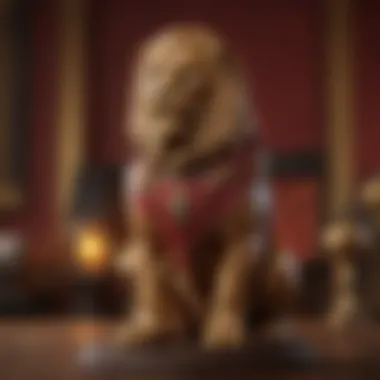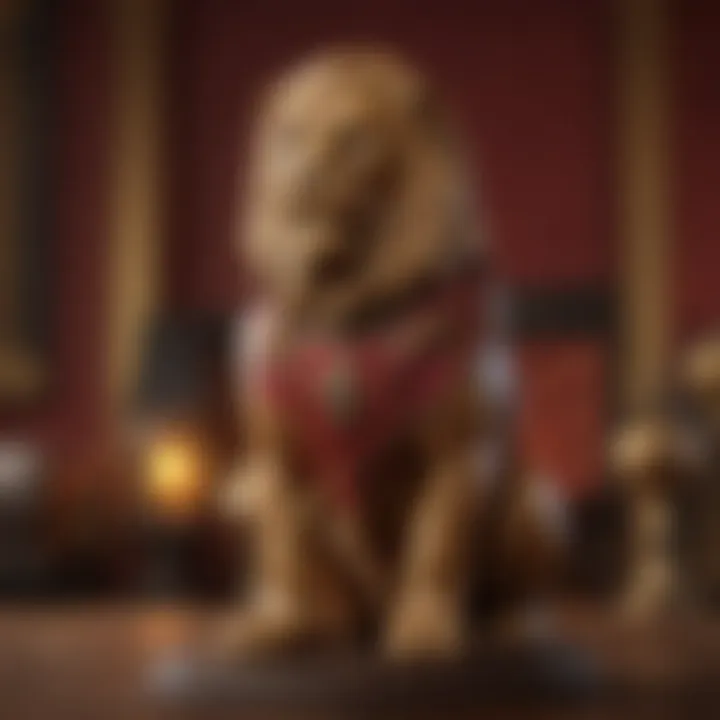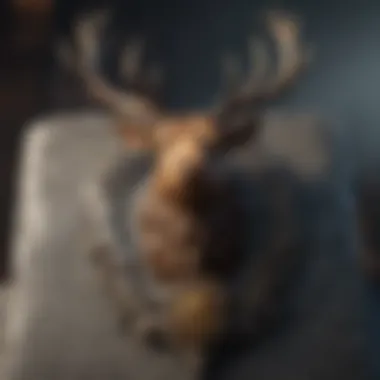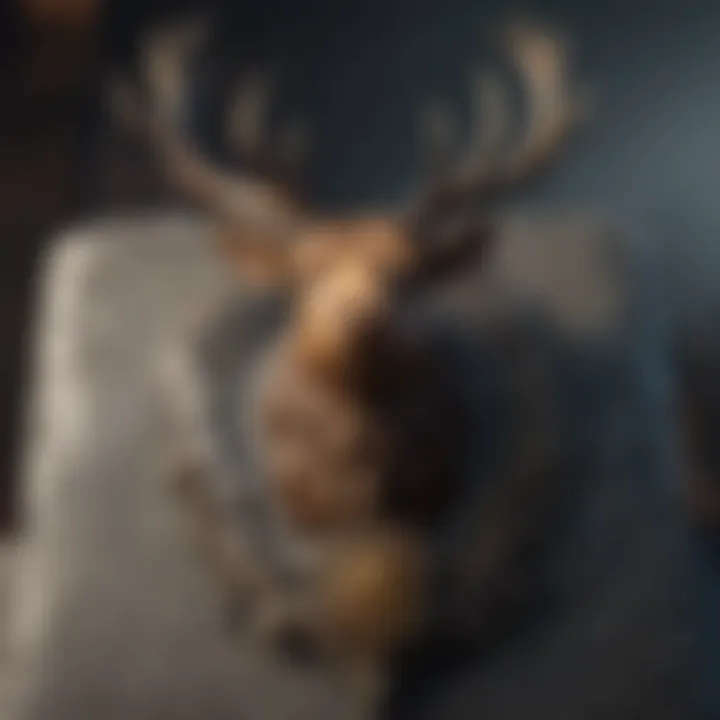Understanding House Identity in Game of Thrones


Intro
The world of Westeros is one filled with intricate layers of politics, power struggles, and, most importantly, identity. Each noble house comes with its own set of values, histories, and intricacies that define not just its members but also the people who connect with them. From the honorable Stark family, rooted in loyalty and resilience, to the cunning Lannisters, who value power and wealth above all, the identities of these houses play a crucial role in the narrative.
When we think about our own identities, we often find parallels between ourselves and the characters that populate this epic saga. The houses serve as mirrors, reflecting a wide array of human traits and societal roles. In this exploration, we will take a closer look at how these identities shape the story of Game of Thrones and, in doing so, prompt reflection upon our own values and allegiances.
This journey will navigate through the various houses, offering insights into the characters that embody their ideals, the epics of their past, and the choices that define their future. Buckle up as we peel back the layers and delve into the fascinating identities that lie at the heart of one of the most acclaimed series in television history.
Character Dissections
Detailed Analysis of Key Characters in Game of Thrones
Characters are the heartbeat of Game of Thrones, each possessing a unique identity tied to their respective house. Let's dissect some of the most notable:
- Eddard Stark: The embodiment of honor, Eddard's unwavering commitment to justice defines House Stark. His values resonate deeply, making viewers reflect on the cost of integrity in a morally ambiguous world.
- Cersei Lannister: Do not let her beauty fool you; Cersei's identity is steeped in ambition and survival. Her ruthless determination reflects House Lannister's propensity for manipulation and power.
- Daenerys Targaryen: Once a pawn in the game, Daenerys evolves into a complex leader. Her journey for the Iron Throne is laden with both empathy and ruthlessness, embodying the Targaryen legacy of fire and blood.
Character Development Throughout the Series
From their first appearances, these characters undergo profound transformations.
- Jon Snow starts as the illegitimate son of a Stark, unsure of his place in the world. His evolution into a leader of men and a unifier of factions speaks to themes of identity and belonging.
- Sansa Stark’s growth from a naive girl into a savvy political player highlights resilience. She embodies the shifting allegiances and the struggle for power that resides in Westeros.
Impact on the Overarching Storyline
The choices made by these characters ripple throughout the narrative, each decision impacting alliances.
"The things I do for love" – Jaime Lannister, revealing the complexity of loyalty and love.
Every character's identity ties intricately into the plot, influencing the fate of kingdoms while showcasing their individual struggles. The consequences are monumental, shaping the very fabric of the story.
Lore Explorations
Westeros is not just a backdrop; it is a living entity with its mythical roots and rich lore. The histories of the houses are often soaked in blood, treachery, and unexpected alliances. This scenery engenders a vivid understanding of how these identities formed over centuries.
- The Targaryens: With dragons at their beck and call, they reign through power and fear. Their identity is inseparable from the fable of fire and blood.
- The Starks: Their connection to the North carries with it the weight of both cold winters and loyalty. "Winter is coming" is not merely a saying for them; it is a way of life that deeply influences their choices.
Exploring these elements unveils connections between the past and present, showing how histories shape the present.
Fan Theories
Theories abound in the Game of Thrones community, each bringing fresh perspectives to familiar narratives.
- Some speculate about Jon Snow’s true parentage, hinting at a deeper connection to House Targaryen.
- Others delve into the significance of the direwolves as guides for the Stark children, discussing their symbolic meanings.
Each theory sparks discussion, bringing fans together in contemplative dialogue. The vibrancy of these theories reinforces the multitudes of identities displayed throughout the series.
End
As we conclude this exploration into house identity within Game of Thrones, it’s clear that these narratives resonate on a personal level. Each house stands as a testament to the complexities of loyalty, ambition, and the human experience. By understanding these identities, fans are invited to reflect on their own values and connections within society.
The dance of power and identity unfolds, weaving a rich tapestry that continues to captivate and provoke thought long after the final episode. As we ponder, we might just find which house resonates with our own identity—whether it be Stark’s unwavering honor or Lannister’s relentless pursuit of power.
Intro to House Identity
When diving into the sprawling world of Game of Thrones, one cannot ignore the often complex and rich identities of the houses that inhabit Westeros. Understanding house identity is more than just recognizing which sigils and mottos belong to each faction; it is about grasping the fundamental beliefs, historical narratives, and cultural legacies that define these houses and, by extension, the characters who pledge allegiance to them. As we turn our gaze toward this subject, it becomes clear that the significance of house identity extends beyond mere entertainment—it provides a framework for understanding personal values and societal roles, which resonate deeply with fans.
For many viewers, selecting a house can feel like a rite of passage. The special connection to a particular house taps into individual aspirations, morals, and even family roots. Consider the emotional swell that comes from declaring "House Stark" or taking pride in the cunning ways of the Lannisters. This realignment of identity encourages viewers to reflect on their place not only in the realm of fiction but within their realities as well. In this article, we will parse through the deep-seated beliefs and values of each house and their role in the broader narrative.
Understanding the personal dimensions of these houses sheds light on why they have permeated popular culture so significantly. Each household represents a spectrum of ideals—from honor and loyalty to ambition and betrayal. The interactions between these noble families essentially weave the intricate tapestry of not just the plot but the moral landscape that defines what it means to belong somewhere.


"Houses in Westeros are more than just names; they embody the complexities of loyalty, identity, and power that resonate with audiences both on and off screen."
With this guiding principle in mind, let’s disentangle the fabric of house identity by exploring how these dynasties operate within the story, the meanings behind their symbols, and how fans connect themselves to these various legacies. This journey reveals a nuanced understanding of why house identity matters, leading us into the next exploration of the concept itself.
Understanding the Concept of House
House identity encapsulates the character traits, history, and beliefs encapsulated within each noble house. At its core, the concept revolves around collective identity—how shared ideals unify individuals under one banner. Various houses embody distinctive philosophies, often represented through their mottos and sigils. For instance, House Stark's motto, "Winter is Coming," underscores themes of preparedness and resilience. On the other hand, House Lannister's "Hear Me Roar!" can be interpreted as a declaration of their pursuit of power and dominance.
Furthermore, the legacy of these houses is propagated through generations, influenced by historical events, key figures, and tragedies that may have shaped their current ideologies. Each house's past is a story woven into its identity, making it critical to understand the roots of their beliefs to grasp why they act the way they do.
- House stark: Resilience and loyalty, often seen through their commitment to the North's harsh winters.
- House Lannister: Ambition and wealth, with a strong focus on influence and cunning strategies for survival.
- House Targaryen: Passion and rebirth, reflected in their fiery connection to dragons and the struggles for reclaiming lost heritage.
The Role of Houses in Westeros
In the political chess game of Game of Thrones, houses play pivotal roles that extend far beyond mere alliances. Each house represents distinct geographical, cultural, and ideological influences that shape the landscape of Westeros. They influence everything from the war strategies to social hierarchies and law-making. The houses challenge one another, resulting in conflicts that drive the series' plot. Their interconnected destinies often echo historical power struggles, making their roles multifaceted.
Moreover, the houses signify not just social status but the very heart of Westerosi culture. They are tied to the land, the loyalty of the people, and the weapons wielded in battle. Each house's moral code and leadership style ultimately determine its longevity and relevance in the ever-shifting political machinations of the realm. As characters navigate these intricate relationships, viewers uncover deeper themes of loyalty, betrayal, and the weight of legacy.
The Major Houses of Westeros
The world of Westeros is shaped fundamentally by its great houses, each presenting a distinct identity and narrative that intertwines with the saga of power, loyalty, and destiny. Exploring the major houses of Westeros not only deepens our appreciation for the rich lore within Game of Thrones, but it also invites us to reflect upon our values and allegiances in the context of contemporary society.
A clear understanding of these houses, their histories, and the traits they embody broadens the scope of discussion. For instance, certain houses are symbols of honor and family, while others exhibit ambition and ruthless tactics. This contrast can lead to insightful conversations about loyalty, ethics, and human nature. Thus, each house stands as a prism through which we can examine personal and societal values.
House Stark
Characteristics and Values
House Stark is not just a family; they are synonymous with honor and duty. Stemming from their cold northern roots, Starks are marked by unwavering loyalty and a strong sense of justice. With their beloved motto, "Winter is Coming," they instill a sense of preparedness and resilience. This ethos of vigilance resonates with many fans because it speaks to the need for integrity, especially in tumultuous times.
However, the dedication to honor can sometimes be a double-edged sword. While these values encourage moral clarity, they also lead to vulnerability against cunning adversaries who manipulate those principles for personal gain.
The Legacy of Winterfell
Winterfell isn’t merely the Stark ancestral home; it embodies their history and culture. As one of the oldest castles in the North, Winterfell symbolizes stability and continuity through generations. It serves as a refuge for the Stark children and a bastion of resilience during the harsh winters, both literal and metaphorical.
What sets Winterfell apart is its weathered stone walls and the godswood at its heart, where Starks seek wisdom and guidance from their past. Though it might seem steeped in tradition, the challenges faced by the Starks — from betrayal to loss — reveal a house grappling with the weight of its legacy.
House Lannister
Power and Ambition
House Lannister personifies ambition and strategic cunning. Their saying, "Hear Me Roar!" echoes the undeniable truth that power often trumps morality in their pursuit. Characterized by their wealth, the Lannisters utilize gold and influence as tools to forge paths to authority, showcasing how capital can be wielded effectively to gain leverage in a cutthroat society.
Yet, this relentless quest for power comes with significant downsides. The unyielding ambition can ultimately lead to moral compromises and a fractured family, with personal relationships often secondary to ambition and strategy.
The Golden Lion's Influence
The golden lion, the sigil of House Lannister, is more than just a symbol; it represents their overwhelming influence in Westeros. The Lannisters’ wealth, derived from their vast gold mines, allows them to dictate the game's rules and manipulate outcomes in ways that other houses can only dream of. This critical asset enables them to entrench their position of power, making them a formidable force in the political landscape.
But as the saying goes, with great power comes great responsibility. The Lannisters often find themselves entangled in webs of their own making, showcasing that power without wisdom can lead to catastrophic downfall.
House Targaryen
Fire and Blood
House Targaryen’s identity hinges upon the duality of fire and blood. This house symbolizes the legacy of dragons and the often turbulent history of power struggles. Their motto, "Fire and Blood," signifies not only strength but also the inherent chaos associated with it. For many, the fierceness of House Targaryen ignites a sense of awe and inspiration, embodying the idea that one’s lineage can wield ultimate power over destiny.
However, the tumultuous nature of this motto shows the darker side of ambition — the internal conflicts and the consequences of legacy can prove to be devastating both for the family and for the realm.


The Ties to Dragons
Dragons are the lifeblood of House Targaryen, acting as both a literal and metaphorical representation of their influence. The ties to dragons illustrate their unmatched status, making House Targaryen unique among the great houses. In the lore, dragons not only grant them unmatched military power but also symbolize their link to fire and transformation.
This affinity provides them with an aura of mystique, drawing fans to their narrative. Yet, reliance on such force also presents vulnerabilities; high expectations may lead to tragic outcomes, especially when dragons themselves become uncontrollable.
House Baratheon
The Storm's Legacy
House Baratheon is often associated with the stormy regions from which it derives its name. Their image as rugged warriors commands respect, reflecting strength and resilience. The storms from which they come symbolize the tumultuous journey to power, marked by both triumph and tragedy.
Pitting themselves against other houses, they embody the spirit of fighting against the odds, appealing to a wide audience that resonates with underdog stories. However, this tempestuous spirit can also lead to internal strife and a divided family.
House Baratheon's Claim to the Iron Throne
The Baratheon claim to the Iron Throne stands as a testament to their ambition and desire for power. Their ascent from a lesser house to ruling dynasty encapsulates the chaotic dance for control seen throughout Game of Thrones. King Robert Baratheon’s rebellion changed the landscape of power in Westeros and exemplifies the unpredictable nature of loyalty and ambition.
The legacy of ruling, however, carries weighty expectations. Mismanagement and contention within the family have proven perilous, illustrating that power does not guarantee stability.
House Greyjoy
Seafaring Traditions
House Greyjoy has a unique cultural identity rooted in the sea. Their strong seafaring traditions speak to their innate desire for independence and freedom. The Iron Islands symbolize a rugged sense of self-reliance that is often at odds with the mainland's political machinations. Their motto, "We Do Not Sow," reflects their rejection of traditional agricultural life, instead embracing a life of raiding and piracy.
However, that independence also comes with a certain degree of isolation, making it difficult for them to forge alliances.
The Ironborn Identity
The Ironborn are not just a family; they represent a lifestyle and philosophy steeped in the harsh realities of their environment. The Greyjoys see themselves as fierce warriors, embodying the grit and tenacity required to thrive in unforgiving surroundings. This identity is a source of pride but also creates a divisive wedge between them and the other houses.
Their perception as outsiders may fuel stereotypes, which can lead to misunderstandings and rivalries with their mainland counterparts.
House Martell
A Different Kind of Power
House Martell breaks the mold of traditional Westerosi houses with its unique approach to power. Their motto, "Unbowed, Unbent, Unbroken," speaks to their tenacity and resilience. This sentiment of individualism and resistance is particularly reflected through their distinct customs and traditions in Dorne, positioning them as a house that values autonomy over sheer force.
However, this nonconformity has also led to friction with other houses, who may view them as eccentric or unpredictable.
The Dorne Perspective
The Dorne perspective offers insights that differ from the typical power dynamics prevalent in Westeros. With an emphasis on diplomacy and political cunning, House Martell approaches conflict with tact rather than brute strength. This unique perspective often leads to clever strategies that help them navigate the intricacies of alliances and enmities.
But, this methodology isn't flawless; slow-burning tactics may leave them vulnerable in situations where aggressive responses are required.
Examining Personal House Affinity
When delving into the realm of Westeros, one might wonder why individuals resonate strongly with particular houses. This connection often transcends mere preference for characters; it speaks to larger themes of identity, values, and personal alignment. By examining personal house affinity, fans can better understand themselves and their motivations, drawing parallels between their lives and the intricate narratives woven throughout the Game of Thrones saga. The exploration of house identity is a journey into self-awareness, as it makes us consider who we are and how we fit into our communities.
Psychological Factors Influencing Alignment
Our preferences for certain houses in Game of Thrones are shaped by an array of psychological factors. These can include personal values such as honor, loyalty, ambition, or cunning. For instance, those who lean towards House Stark may hold strong family values and prioritize honor. The very essence of Stark's motto, "Winter is Coming," can resonate deeply with individuals who value prudence and preparedness.
On the other hand, a preference for House Lannister could stem from a person's admiration for wealth and power, reflecting their own aspirations or experiences. Their motto, "Hear Me Roar!" showcases determination and assertiveness, qualities that some might strive to emulate.
Housing preferences can also be linked to one's upbringing. A person raised in a competitive, aggressive household may feel an affinity for the more ruthless traits exemplified by characters in House Baratheon or House Greyjoy. These connections may unfold unconsciously, shaping how individuals view their roles both in society and within their personal relationships.


Ultimately, analyzing these psychological dimensions allows fans to take a closer look at their own characteristics and motivations, creating an avenue for personal growth.
Social Influences on House Preference
Just as the seasons change in Westeros, so too can our preferences sway based on social influences. Peer dynamics play a substantial role in shaping house identity. For example, a group of friends sporting Stark sigils might naturally foster a shared identity among the members, solidifying their allegiance to that clan. This sense of belonging can be a powerful impetus for defining one’s self-image.
Moreover, the narratives portrayed in Game of Thrones and their discussions within fan communities on platforms like Reddit or Facebook can create societal norms around certain houses. When major events happen in the series—like a significant character's death or triumph—how fans react can influence what houses remain in favor over time. If a character from House Targaryen undergoes arc redemption, for instance, you might notice a surge in Targaryen fans just trying to emulate the thrill of that narrative shift.
House preference in many cases can turn into a marker of social identity, wherein cultural touchpoints create a broad canvas from which individuals portray their factions. From fan conventions to merchandise, the intertwining of house identity and social circles creates a vibrant tapestry that emphasizes our connections to both fictional worlds and each other.
"Understanding the roles of both psychological motives and social circles opens the door to deeper personal reflections and connections with our favorite houses."
Through analyzing these elements, fans can appreciate the various ways that house identity serves as both a personal compass and a social connector, enriching the overall experience of Game of Thrones.
Cultural Impact of House Identification
Exploring how individuals connect with the identities of various houses in Game of Thrones provides insight into broader cultural phenomena that extend beyond mere entertainment. The notion of house identity resonates with significant implications for understanding personal values, social connections, and cultural membership. Within popular culture, these house identities play a crucial role in shaping fan interactions, community bonds, and even merchandising strategies. Ultimately, Game of Thrones has carved out a space not just as a beloved series, but as a cultural touchstone that influences how people see themselves and their relationships with others.
Community and Fan Culture
House-related Merchandise and Engagement
The market for house-related merchandise has become a vibrant reflection of how deeply fans associate with the houses of Westeros. Items ranging from t-shirts bearing the Stark direwolf to Lannister wine glasses not only serve as consumer goods but as symbols of identity. Fans don’t merely purchase these items; they use them to express loyalty and allegiance.
One noteworthy characteristic of this merchandise is its ability to create a tangible sense of belonging. When a die-hard fan of House Targaryen wears a dragon insignia, they’re not just donning a piece of clothing, but they’re broadcasting their connection to the fiery legacy of Daenerys Targaryen.
However, it’s essential to consider both advantages and disadvantages. On one hand, merchandise fosters community by encouraging fans to display house pride. On the other, the commercialization of these identities can dilute their meaning, making them less about personal connection and more about consumption.
Online Communities and Fandom
Online communities surrounding Game of Thrones have flourished, creating spaces where fans can dive deep into discussions about their favorite houses. Platforms like Reddit and dedicated Facebook groups serve as hubs for sharing fan theories, memes, and interpretations of house identities. This interaction highlights another crucial aspect: the exchanges occurring in these communities enable fans to articulate and refine their own understanding of what it means to belong to a specific house.
The key takeaway here is the sense of camaraderie cultivated within these digital spaces. For many fans, being part of an online house community has morphed into an extension of their identity. Nonetheless, there’s a thin line, where sometimes trivial disputes about house supremacy can surface, leading to discord rather than unity.
House Identity in Popular Media
The Influence of Game of Thrones on Other Works
The success and pervasive influence of Game of Thrones have encouraged writers and creators across various media to adopt similar house-driven narrative structures. This impact is particularly visible in the fantasy genre, where different houses or factions have emerged as a staple narrative device. It seems many creators have recognized that house-like affiliations resonate well with audiences, tapping into the human fondness for tribalism.
One might argue this is beneficial as it creates a framework where character allegiances can become more complex and multi-faceted. However, over-reliance on these archetypes may lead to clichéd storytelling, potentially overshadowing fresh narratives.
Crossover with Other Fantasy Genres
The introduction of house identities in Game of Thrones has undoubtedly fueled a crossover influence on other fantasy works. Several series now feature prominent faction-based dramas, underlining shared themes of loyalty, power, and betrayal, which Game of Thrones deftly explored.
This characteristic of crossover can be seen as advantageous by enriching the fantasy landscape. Other creators now have rich source material to draw upon, making it possible for audiences to recognize and appreciate multi-layered character interactions.
Yet, there is a downside, as some critics argue that imitation without innovation may lead to stagnation within the genre. If every newly crafted fantasy narrative sticks too closely to the Game of Thrones formula, the richness of variety could suffer.
"Understanding house identity is more than just liking dragons or Stark wolves; it's about reflecting on how those elements connect to who we are in a broader cultural context."
This cultural impact illuminates the various ways individuals navigate identity through their choice of house, contributing to a deeper understanding of personal values and societal interactions. As fans engage with these narratives, they find their reflections encompassing not only what it means to belong but also what it means to navigate the tumultuous world of loyalty.
Finale: The Essence of House Identity
Understanding house identity in Game of Thrones goes beyond mere factional allegiance; it delves into the intricate fabric of personal and communal connection. Each house represents not just a lineage or crest – it embodies a set of ideals, traditions, and moral compasses that resonate with the fans on various levels. This article has illuminated various characteristics defining each house, revealing not only their historical significance but also how they mirror real-world societal structures.
Reflecting on personal identity becomes crucial here. When individuals identify with a house, they often do so because they see parts of themselves reflected in its values. For instance, the Stark's emphasis on honor and loyalty may appeal to those who value family and integrity. In contrast, Lannisters' calculated pursuit of power might resonate with people who prioritize ambition and wealth. Understanding these connections helps readers recognize why they gravitate towards certain houses and how those choices inform their perspectives on loyalty, friendship, and even conflicts in their lives.
Additionally, the ever-evolving nature of loyalty within the series reflects broader human experiences. Characters in Game of Thrones often grapple with their commitments, shifting their alliances based on circumstance or personal growth. This complexity invites us to consider how our own loyalties change over time; relationships shift and personal values evolve, drawing parallels to our interactions with franchises like Game of Thrones. It encourages a dialog about how these experiences shape us as individuals and as part of a collective community.
Ultimately, house identity serves not only as a narrative device in the world of Westeros but also as a lens through which we can explore our personal identities. The intricate interplay of these characters and their homes nudges fans to contemplate their roles and affections within the broader landscape of morality, power struggles, and personal growth.
"House identity is, after all, not just about where you come from, but where you choose to belong and how it shapes who you are."
In summary, delving into the essence of house identity enriches our understanding of both the Game of Thrones universe and ourselves. By exploring these identities, we develop a more profound connection to the story and, in doing so, encounter reflections of our own values and experiences.



